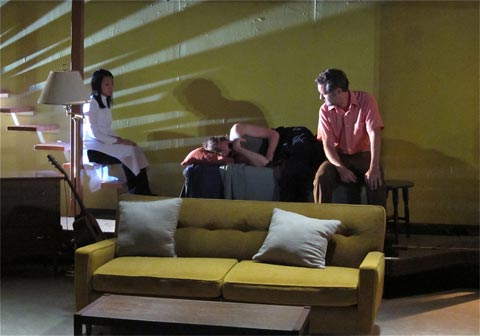
LACERATING The Wellfleet production captures David Rabe's black comedy in all its caustic parody, empathy, and rage. |
Relevance tends to turn up like the proverbial bad penny. David Rabe's 1972 Tony Award-winning Sticks and Bones, which is being revived by Wellfleet's Harbor Stage Company (through September 8), has one foot in the froth of mid-20th-century television, the other in the morass of Vietnam. Yet with legions of damaged Americans returning from Iraq and Afghanistan, Rabe's black comedy proves as lacerating today as when he wrote it (as part of a Vietnam trilogy that also includes The Basic Training of Pavlo Hummel and Streamers) in the wake of an 11-month tour "in country." The Simpsons has replaced The Adventures of Ozzie and Harriet as the longest-running sitcom in history, proof that no one is coming home to as relentlessly sunny and insular a homeland as that of the play. But Sticks and Bones still wields the cliché-rattling power that caused many CBS affiliates to duck and cover rather than air the TV-movie version produced in 1973.
The setting is chez Nelson circa 1968, when a convoy of trucks bearing the walking wounded arrives at the door delivering Ozzie and Harriet's embittered older son, David, blinded in Vietnam but determined to make his nuclear clan open their eyes to the ugliness beyond their happy-go-lucky, blinkered existence. For those not old enough to remember the Nelsons, who lived their lives on the small screen (somewhere between a sitcom and reality TV, it now seems) from 1952 to 1966, David's relatives include ice-cream-eating dad Ozzie, kitchen-bound mom Harriet, and guitar-strumming younger brother Rick, who in the late '50s became a teen rock star. Here he's a handsome lug who ambles in and out, primarily to masticate some of Mom's fine fudge and snap photos of family doings, however mucked up they are by the despairing and volatile David.
Sticks and Bones must be a difficult work to pull off, because it is by no means tonally consistent. Harriet and Rick are broadly caricatured, though they ultimately surprise you. David is shadowed by the presence of the Vietnamese girl he left behind (a mute, somewhat puzzling device until the end), discovering too late that she was the one thing tethering him to his humanity. The returned vet's lashing out can be quite funny, as when he whacks Harriet's mainstay, the unctuous Father Donald, with his white cane every time the priest tries to bless him. But at other times he speaks a depressive, arguably banal poetry. Ozzie is perhaps the most interesting character, David's crisis seeming to trigger in him one of his own. Alternately rueful and manic, he reminisces à la Rabbit Angstrom of an athletic youth and compiles a large stack of curriculum vitae — lists of all his possessions and their monetary value — that he frenziedly orders family members to distribute to all and sundry on every occasion possible.
 Topics
Topics:
Theater
, Theater, Arts, Wellfleet